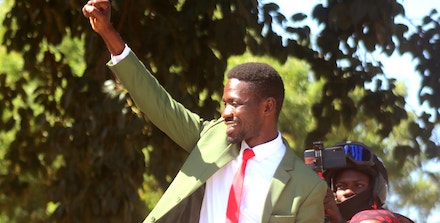Bobi Wine. Gen. Museveni is trying to deprive him of victory. Photo: Facebook.
When it was announced that the forthcoming MTV MAMA awards would be held in Uganda and hosted by DJ Khaled, Ugandans griped.
Not because DJ Khaled gets to childishly chant “DJ KHALED, WE DA BEST!” once again. But because many of us believe Uganda has better hosts than the elaborately bearded hit maker. Now, some Ugandans are calling for a boycott of the said awards.
Their argument is predicated on the Double Whammy of freeing Bobi Wine and spotlighting an increasingly repressive regime. As a contrary wind, critics of this boycott say such a move will hurt Uganda’s image with damaging Public Relations. Thereby mothballing any efforts to revive a Covid-hit tourism sector.
While I sympathize with the critics’ view, I believe a boycott is necessary. Firstly, because it falls in line with passive resistance. This disembarrasses the opposition’s “Defiance” from violence and thereby avoids the bloodbath Museveni wishes to baptize National Unity Platform (NUP) with.
It is obvious that Museveni’s finger is on the trigger and he just wants a chance to mow down innocents in the name of “order and stability”. Secondly, a boycott amplifies General Museveni’s purported preference for substance over Public Relations. So, in this sense, even the president would in theory agree with such a boycott.
After an election marred by death, intimation and electoral fraud, the game is up. Everyone knows this elections was held to consummate a shotgun wedding between Ugandans and their 35-year-old NRM bride.
A bride who has been around the proverbial block, turning more tricks than a hooded temptress from the infernal underworld. Ugandans and Uganda deserve better. We all know about the internet shutdown during the rigged election and the continuing social media blackout intended to keep democracy in the dark after the election. We also know about the Uganda Communications Commission’s whitepaper being blotted by proposals to gag free artistic expression. Yet art is the self-portrait of a nation in the making.
We also know Kampala has been turned into an armed camp ever since the elections ended. Still, with this knowledge, some of us choose to believe the MAMA awards will serve as a magic wand to make all our troubles go away.
Artists, already mocked Gen. Museveni when he has no use for their services, are in danger of being pushed to the fringes of society. All because they mistake the glitter for the gold. A boycott would assert not only artistic autonomy, but would also draw a line in the sand against General Museveni’s militocracy.
Sure, the MAMA Awards and the (already dented) image of our country shall take a hit. But just remember that everything worth having in this world demands sacrifice. Also, remember that such a boycott stands on the right side of history.
Disinvestment, upon which such a boycott is based, was a powerful form of protest against South Africa’s system of Apartheid. This disinvestment campaign, supported by federal legislation enacted in 1986 by the United States, is credited with forcing the racist Apartheid regime to the negotiating table. This then led to the dismantling of the Apartheid system.
Of course one might argue that present-day Uganda and Apartheid-era South Africa are apples and oranges. However, must we wait until our country goes completely pear-shaped before we take action? It’s true, Gen. Museveni’s regime has not yet spiraled the lows of Gen. Idi Amin’s. Still, we recognize a worrying trend towards fascism which far surpassed anything ever seen in Uganda.
To borrow from, and to paraphrase, the theologian Reinhold Niebuhr:
First they came for Paul Ssemwogerere, and we did not speak out—because we were not Democratic Party supporters. Then they came for Kizza Besigye, and we did not speak out— because we were not Forum for Democratic Change supporters. Then they came for Robert Kyagulanyi, and we did not speak out—because we were not National Unity Platform supporters.
Then they came for us—and there was no one left to speak for us.
It is time to speak for ourselves, and our freedoms.







